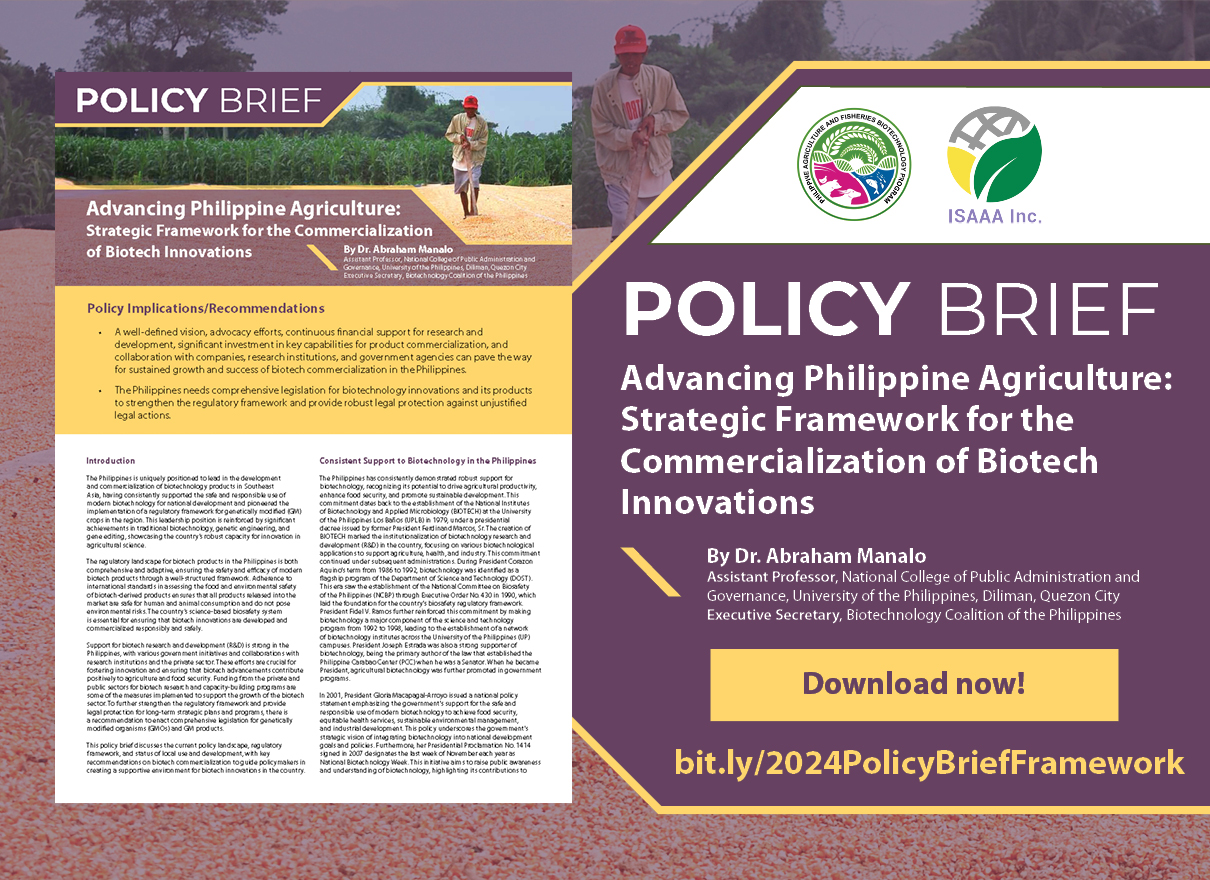The Philippines
July 17, 2024
ISAAA Inc., in partnership with the Philippine Agriculture and Fisheries Biotechnology Program (DA Biotech), published a policy brief titled Advancing Philippine Agriculture: Strategic Framework for the Commercialization of Biotech Innovations. The policy brief is authored by Dr. Abraham Manalo, Assistant Professor at the National College of Public Administration and Governance at UP Diliman and the Executive Secretary of the Biotechnology Coalition of the Philippines (BCP).

Filipino scientists have created many biotech products that aim to help the country’s agricultural and fisheries industries. However, not all of these technologies are commercially released and used by the target stakeholders. A framework for the commercialization of these innovations will greatly help in bringing them into the market.
The policy brief presents the status of biotechnology in the Philippines and gives examples of Pinoy biotech products that were approved for commercialization. Recommendations for boosting the approval and acceptance of biotechnology products in the Philippines were also discussed in this policy brief.
Biotechnology in the Philippines
The Philippines is one of the leading countries in the field of biotechnology. To strengthen the country’s position, the national government has expressed support for biotech through the establishment of different institutions, such as the National Institutes of Biotechnology and Applied Microbiology (BIOTECH), the National Committee on Biosafety of the Philippines (NCBP), and the Philippine Carabao Center (PCC).
The country’s regulatory framework is also continuously updated to guarantee the development, commercialization, and use of biotech products safely and efficiently. In 2006, the National Biosafety Framework (NBF) was established under Executive Order No. 514. The NBF is used by the NCBP during their task of supervising the biosafety regulations and collaborating with different government organizations that are involved in biotechnology regulation.
In 2021, the Joint Department Circular (JDC) No. 1 was released, which offers guidelines for the research, development, management, and usage of GMOs in the country. The Department of Agriculture Memorandum Circular No. 8 was also established to give guidelines for the regulation of PBIs or products of gene editing technologies used in plants. The JDC, the guidelines for PBIs, and the NBF all comply with prescribed international standards and best practices.
Examples of Pinoy Biotech Products
Bt corn was approved for commercial use in the Philippines in 2002. This biotech crop contains genes from the bacteria Bacillus thuringiensis (Bt), which makes it resistant to the Asiatic corn borer boosting the yield and income of farmers. Since the Filipino farmers have seen the benefits of Bt corn, many of them continue to plant biotech corn seeds including varieties with herbicide tolerance. To date, biotech corn has been planted on more than 720,000 hectares in the country.
Golden Rice or Malusog Rice, is a GM rice variety enriched with beta-carotene to help combat vitamin A deficiency in the Philippines. The biotech crop received its biosafety permit for commercial propagation in 2021. Bt eggplant is another GM crop that contains genes from Bacillus thuringiensis (Bt), which makes it resistant to the eggplant fruit and shoot borer pest. It is approved for commercial cultivation in 2022. However, Golden Rice and Bt eggplant face legal issues from biotech critics who brought their concerns to court. This kind of situation shows the importance of having legal protection for approved biotech products in the Philippines.
In light of these considerations, the brief provided the following policy recommendations:
- A well-defined vision, advocacy efforts, continuous financial support for research and development, significant investment in key capabilities for product commercialization, and collaboration with companies, research institutions, and government agencies can pave the way for sustained growth and success of biotech commercialization in the Philippines.
- The Philippines needs comprehensive legislation for biotechnology innovations and its products to strengthen the regulatory framework and provide robust legal protection against unjustified legal actions.
The policy brief on Commercialization of Biotech Innovations is a part of the project titled "Awareness Building on Biotechnology and Products of Philippine Biotechnology (Conventional and Modern Biotechnology)," also called "Pinoy Biotek na Tayo" which prioritizes communicating biotechnology to help increase the awareness of stakeholders on Pinoy biotech crops and products.
Download the policy brief from the ISAAA website.